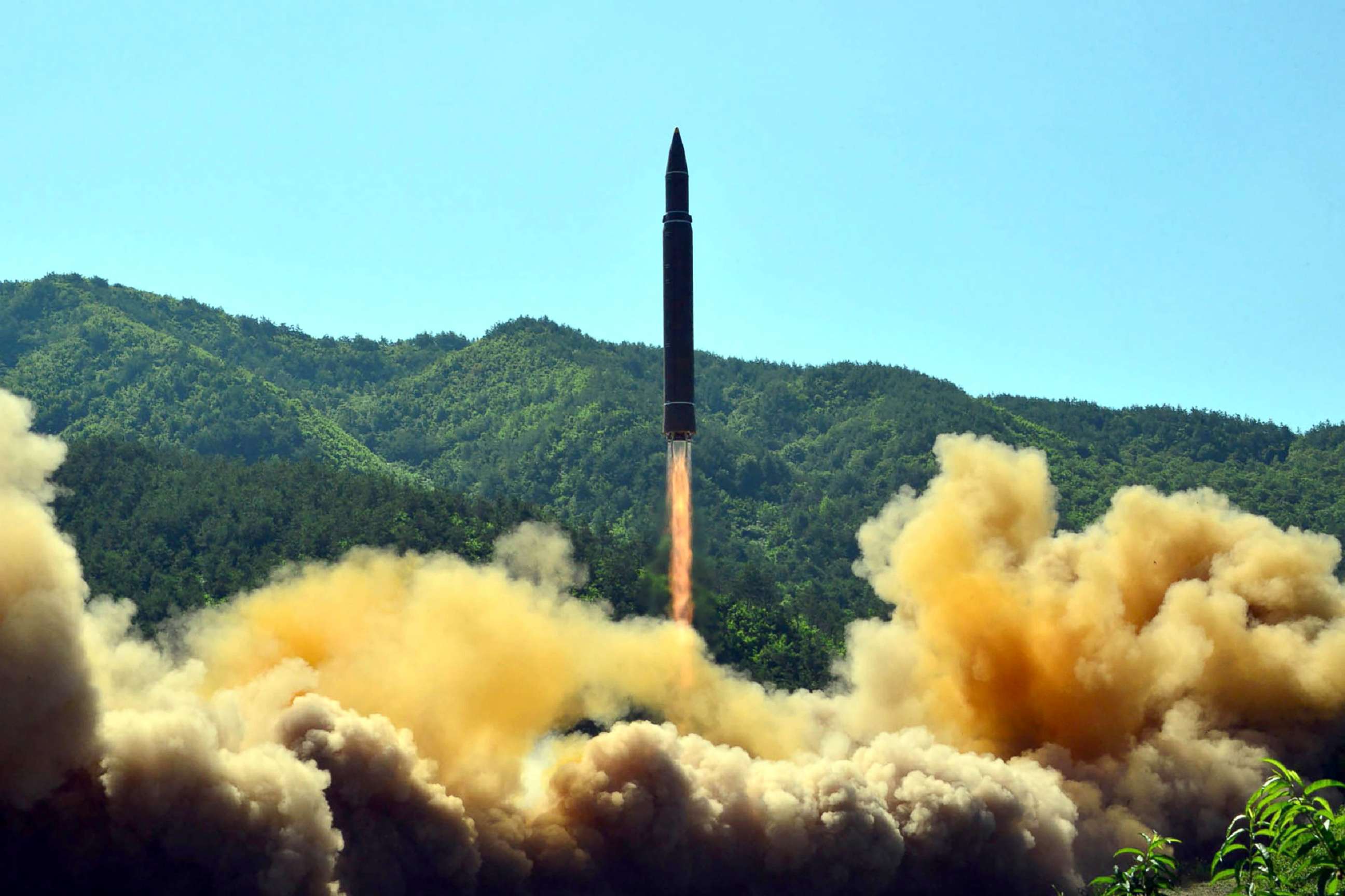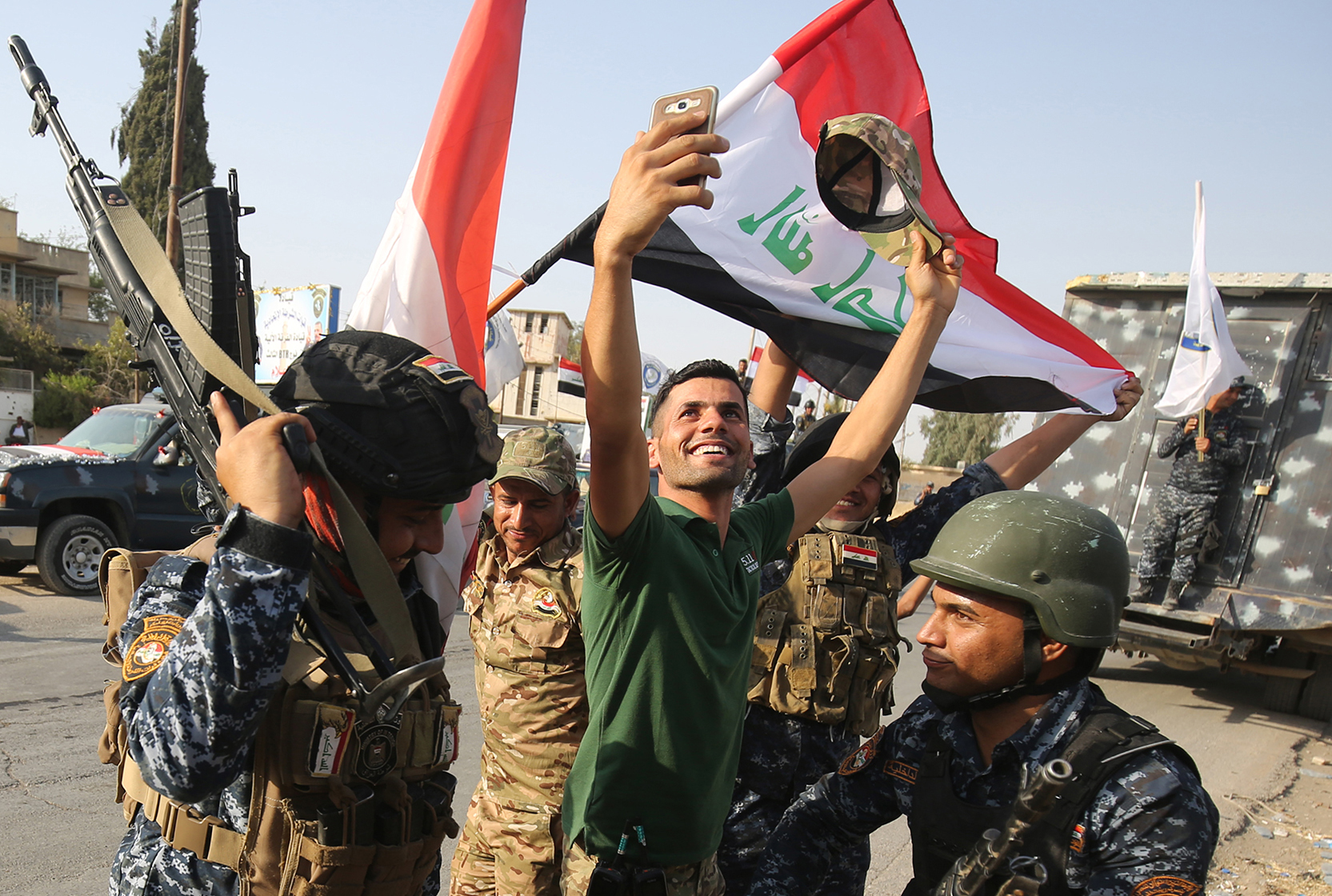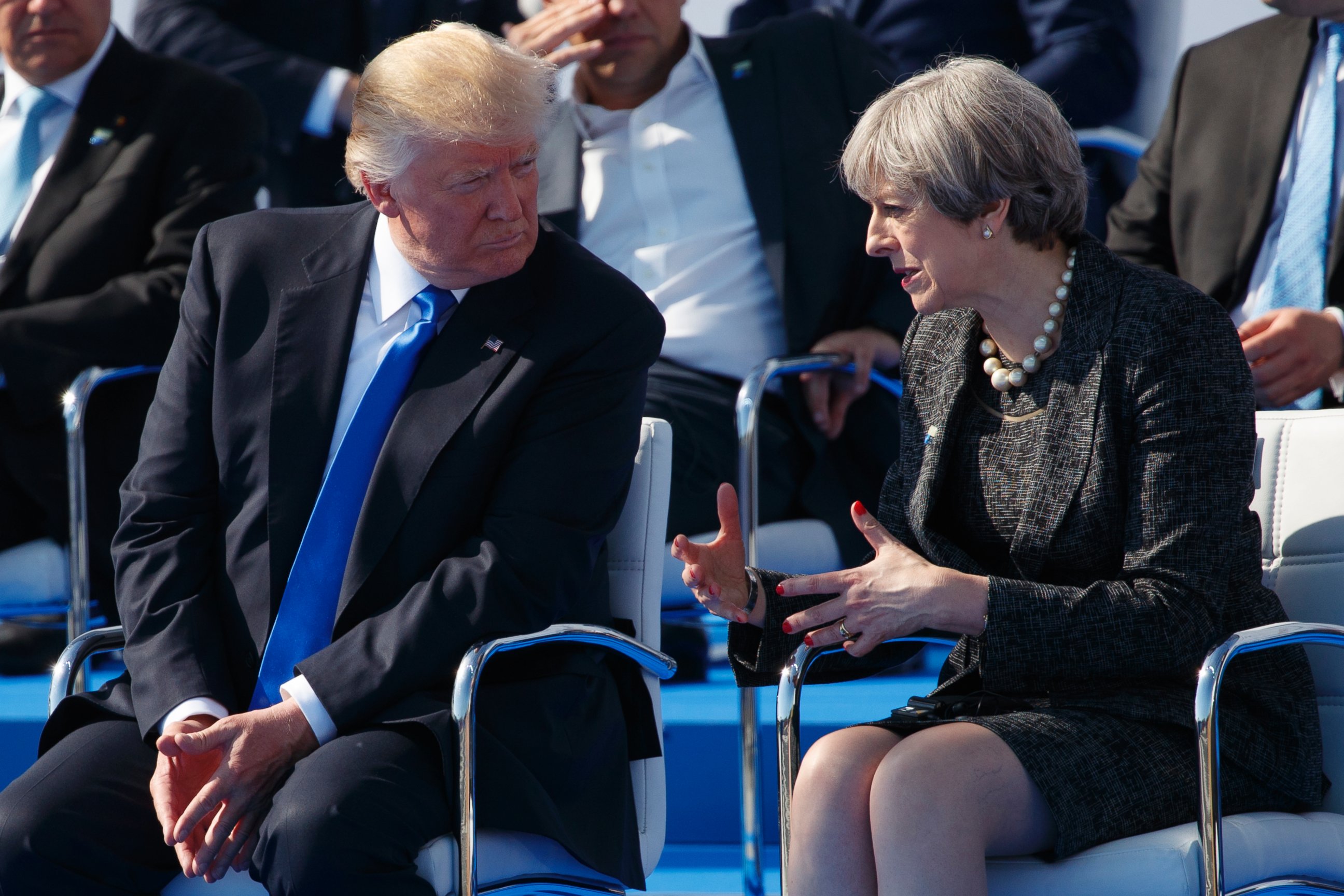ANALYSIS: How Trump's foreign policy has affected global relations since assuming office
President Trump has already left an indelible mark on international relations.
— -- President Donald Trump has been in office for just six months, but if there is one thing critics and supporters can agree on, it’s that in that short time, he has left an indelible mark on international relations.
Shaking up traditional alliances, surprising adversaries with military action and facing new threats around the globe, Trump has not only altered the course of U.S. foreign policy but also disrupted the world order — and the decisions he has made and rhetoric he’s used in six months will have an impact for years.
Here, a look at the foreign policy moments that mattered and where the world may be headed:
North Korea: Successful ICBM test met with diplomacy
On July 4, North Korea delivered what it called a “gift” to the United States, the successful launch of an intercontinental ballistic missile, which traveled into a high-altitude trajectory of 1,730 miles before splashing into the Sea of Japan. It was the 10th missile test since Trump took office and marked a substantial development in North Korea’s missile program: The rogue regime finally had a missile capable of reaching the U.S. if fired in the right trajectory.
Yet experts assess that North Korea does not presently have the re-entry technology needed for a nuclear warhead to reach its target, nor does it have the ability to miniaturize a nuclear warhead for mounting on an ICBM. But as with some previous tests this year, the ICBM was fired via a mobile launcher, making it harder for U.S. intelligence to track the movement of North Korea’s weapons before they’re fired.

Secretary of State Rex Tillerson referred to the ICBM test as “a new escalation of the threat to the United States” and its allies. But the Trump administration has insisted it will use diplomacy first in dealing with this latest provocation.
Any additional sanctions levied against North Korea would require China’s cooperation to be considered effective. But Trump has sent mixed messages on whether he feels China is doing enough to put pressure on Kim Jong Un’s regime. Asked in the days after the ICBM test if he had given up on Chinese President Xi Jinping, Trump responded, “Never give up.”
For its part, China, along with Russia, has called for a freeze for freeze, in which North Korea would halt its nuclear and missile programs in exchange for a stop to U.S.–South Korean military exercises — an option the U.S. is highly unlikely to consider.
Russia: The Trump-Putin meeting and the push to work together
For months now, the Trump administration has been dogged by questions about ties between his team and the Russian government, with the FBI and two congressional committees investigating. But that hasn’t stopped Trump from praising Russian President Vladimir Putin and calling for better relations with his government, tasking Tillerson with doing just that.
That enthusiasm for working with the country that hacked the Democratic National Committee and Hillary Clinton’s campaign chairman and tried to influence the 2016 presidential election has triggered heavy criticism — and put an intense spotlight on Trump and Putin’s first meeting, in July at the G-20 summit. Trump has cast doubt on the finding of U.S. intelligence agencies that Russia was behind the hack.
Trump said he spent the first 20 to 25 minutes of the meeting asking Putin whether he ordered the hacking, which Putin denied. Since then, the White House has urged moving on from the issue, but the three investigations continue as revelations of connections and meetings between Trump officials and Russians emerge.
Tillerson announced that Trump and Putin agreed to create a “framework” to work together on cybersecurity issues — something Treasury Secretary Steve Mnuchin praised as “a significant accomplishment.” But hours later, after the idea was widely derided, Trump walked it back, tweeting, “The fact that President Putin and I discussed a Cyber Security unit doesn’t mean I think it can happen. It can’t.”
The fact that President Putin and I discussed a Cyber Security unit doesn't mean I think it can happen. It can't-but a ceasefire can,& did!
— Donald J. Trump (@realDonaldTrump) July 10, 2017
Still, his administration has continued to push ahead on cooperation on other issues, including a small cease-fire in Syria and a series of meetings on “irritants” in the relationship, including the return of two Russian diplomatic compounds in the U.S.
The White House was in damage-control mode just weeks later for not disclosing another meeting Trump had with Putin during the summit. They met at a reception in front of cameras, shaking hands and briefly chatting. But at a dinner that evening, the two spoke at length, using only Putin’s interpreter, in a breach of protocol; the administration criticized scrutiny of that conversation as “hysteria.”
Syria: ‘America first’ becomes American firepower becomes ...?
The “America first” president shocked the world with a strong response to the use of chemical weapons in Syria. Just days after the regime of Syrian President Bashar al-Assad reportedly attacked the town of Khan Sheikhoun with sarin, a nerve gas, Trump ordered 59 Tomahawk strikes on the air base where Assad’s planes are said to have taken off.
“I now have responsibility, and I will have that responsibility and carry it very proudly,” he said at a Rose Garden press conference.
Critics on the left and right were surprised that the businessman who had decried years of wasteful spending on wars in Iraq and Afghanistan was ready to play the world’s policeman, but allies — from the U.K. to Israel — applauded the response.
Since then, however, the administration has pushed hard to work with Russia in Syria, brokering a small cease-fire together with Jordan in Syria’s southwest corner. Trump has announced plans to expand that agreement, despite criticism that it has aided the Assad regime by freeing it up to take on rebels elsewhere and that it has cemented Iranian influence in the area by doing nothing to expel Iranian-backed militias.
The push to join forces to fight terrorism in the civil-war-plagued country has led to speculation that the White House is conceding to Russia’s plans for Syria, abandoning support for the opposition and calls for the removal of the brutal dictator Assad.
ISIS: After liberation of Mosul, the fight continues
Three years after Mosul, Iraq’s second-largest city, was taken by ISIS, Iraqi Prime Minister Haider al-Abadi declared Mosul “liberated” this month. The battle, waged by Iraqi security forces and Kurdish peshmerga fighters and backed by the U.S.-led coalition, lasted nine months.
It was a considerable a success for the people of Iraq — 940,000 of whom were displaced by the Mosul campaign. While about 220,000 have returned to eastern Mosul, the United Nations estimates it could cost $1 billion to restore basic infrastructure to the city.

Extensive clearing operations are underway to check rebel tunnels and caves and identify ISIS fighters still undetected. Thousands of policeman and border guards, trained by the coalition, will now have the daunting task of holding the city and fending off any incursions.
Now Iraqi forces are moving west to secure the city of Tal Afar. At the same time, Syrian Democratic Forces and coalition troops are in the second month in the fight for Raqqa, ISIS’ de facto capital in Syria. The Pentagon has acknowledged the SDF is taking heavy casualties but making progress into the city center.
In addition to these areas, ISIS still has strongholds in places like Hawija, Iraq, and south along the Euphrates River Valley — retaining a little over 2 percent of territory in Iraq and slightly more than 8 percent in Syria.
Unlike in Iraq, once ISIS loses its foothold in Syria, there won’t be a unified government to maintain stability. For now, the coalition is preparing local groups to police in and around Raqqa. But the larger war between rebel groups and Assad’s forces, supported by Russia and Iran, will prove a challenging environment, even in a post-ISIS era.
NATO: Trump talks tough but turns off allies
Trump’s major address to NATO was an equally telling moment of how his administration has upended U.S. foreign policy.
He stopped in Brussels in May, on his first overseas trip as president, for a speech unveiling two memorials at the entrance to NATO headquarters, including one commemorating the alliance’s Article 5, which commits members to collective defense. But on the campaign trail and as president-elect, he repeatedly blasted NATO as “obsolete,” raising doubts about his commitment to it and that mutual-defense pledge.
While he changed his tune in April about “obsolete,” he used the speech in May as an opportunity to put longtime allies on notice, demanding they pay their “fair share” in defense spending and even suggesting that some countries owe the U.S. money for not having done so.

Trump did not explicitly pledge a commitment to Article 5, something European allies were looking for, with leaders standing next to Trump at the ceremony exchanging looks of bewilderment and amusement.
While Trump made that pledge at a press conference with the Romanian president the next month — and called for unity in a major address in Warsaw, Poland, in July, critics say the damage was already. As German Chancellor Angela Merkel told a crowd of political supporters one week after the Brussels speech, Europe “really must take our fate into our own hands.”
Afghanistan: The mother of all bombs but no new strategy
Three months into office, Trump greenlighted the use of the most powerful nonnuclear weapon ever used in combat, nicknamed the mother of all bombs. The 22,000-pound GBU-43, or massive ordnance air blast, was dropped on a complex of ISIS-controlled caves in eastern Afghanistan on April 13.
The Pentagon has declared ISIS’ numbers in Afghanistan are declining. Last week the U.S. took out the third emir of ISIS in Afghanistan, Abu Sayed, after killing the second emir in April.
Though only halfway through its fighting season, the Taliban has lost some territory — resorting to false social media claims of U.S. casualties to distract from battlefield losses.
Yet Afghanistan remains a dangerous place, with terrorist strongholds in several areas of the country. Seven U.S. service members have been killed in action there so far in 2017. (Nine were killed in action in all of 2016.) And it is uncertain whether Afghan forces will be able to hold the territory they manage to recapture.
The Trump administration’s long-awaited review of the U.S. strategy for Afghanistan was supposed to be rolled out in mid-July and is expected to include as many as 4,000 additional U.S. troops, meaning the 16-year war is far from over.




